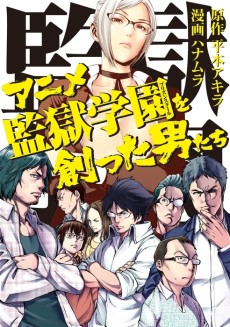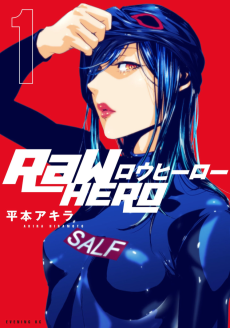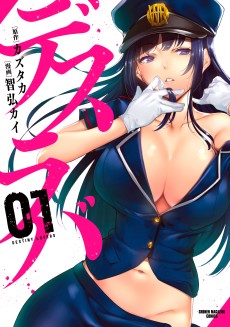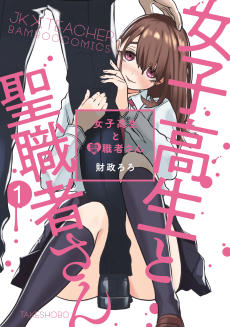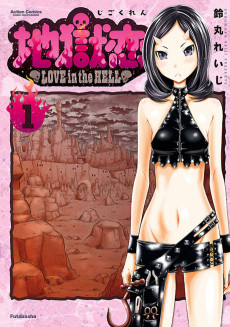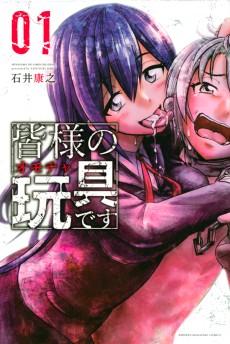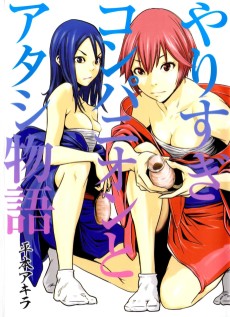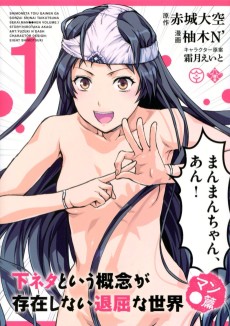PRISON SCHOOL
STATUS
COMPLETE
VOLUMES
28
RELEASE
December 25, 2017
CHAPTERS
279
DESCRIPTION
On the outskirts of Tokyo stands Hachimitsu Private Academy, an all-girls boarding school for elite young women. But as the new school year rolls around, one tradition is going out the window: For the first time in the school's long history, boys are being allowed to enroll. On the first day of school, though, it turns out only five boys have made the cut. Thrilled by this discovery, these young men's adolescent hearts leap with joy at the thought of being surrounded by all those girls, but little do the five boys suspect the shocking fate that awaits them...
(Source: Yen Press)
Notes:
- Includes 1 extra chapter and the epilogue.
- Won the Kodansha Manga Award 2013 for best general manga.
CAST

Takehito Morokuzu
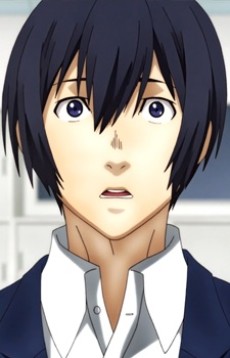
Kiyoshi Fujino
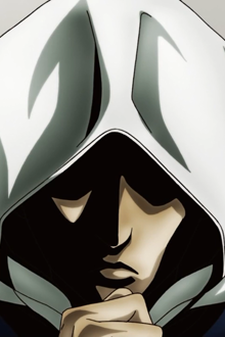
Jouji Nezu
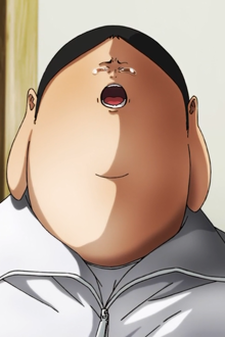
Reiji Andou
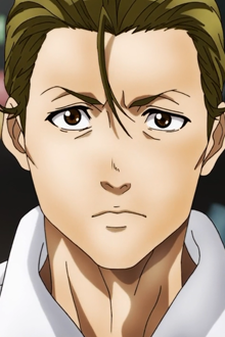
Shingo Wakamoto
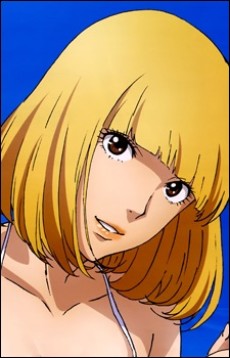
Hana Midorikawa
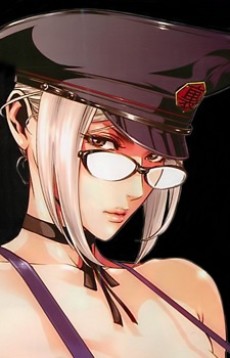
Meiko Shiraki
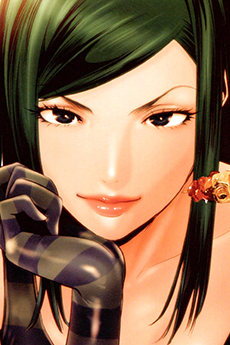
Mari Kurihara
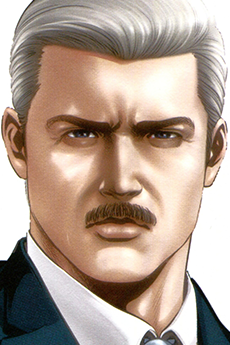
Kurihara
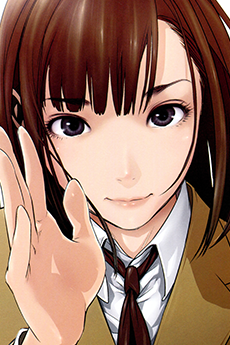
Chiyo Kurihara
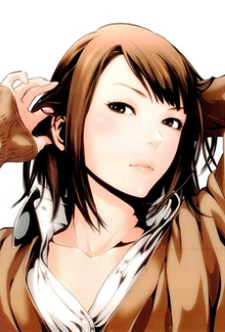
Anzu Yokoyama
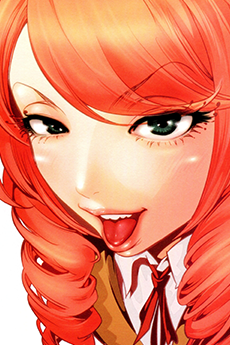
Kate Takenomiya
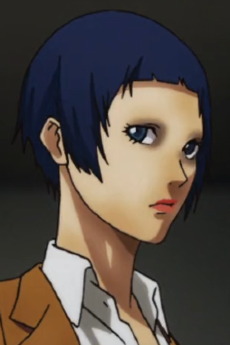
Risa Bettou
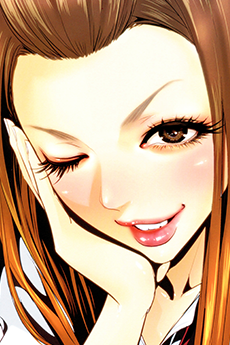
Bitch
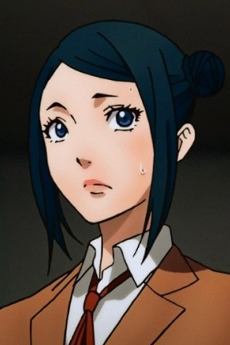
Mitsuko Yokoyama
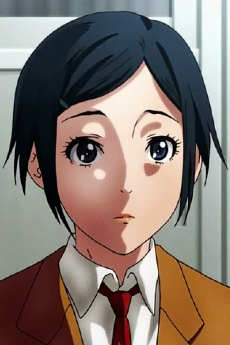
Mayumi Tanaka
CHAPTERS
RELATED TO PRISON SCHOOL
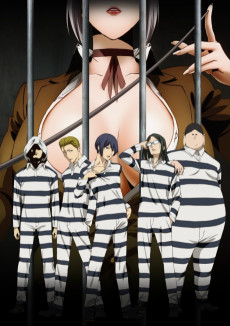 ANIME ComedyPrison School
ANIME ComedyPrison School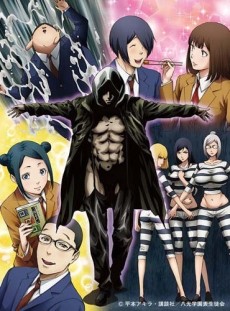 OVA ComedyPrison School: Mad Wax
OVA ComedyPrison School: Mad Wax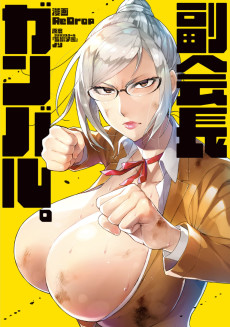 MANGA ComedyFukukaichou Ganbaru.
MANGA ComedyFukukaichou Ganbaru.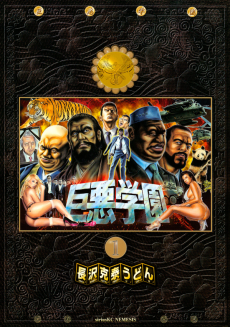 MANGA ComedyKyoaku Gakuen
MANGA ComedyKyoaku GakuenREVIEWS

vahsahbeh
80/100The manga does have unnecessary, stretched out scenarios, but it sure is worth reading. Just enjoy the story as it is.Continue on AniListThis manga is truly one of a kind. The setting it takes place is interesting enough. People might think the manga's primary focus when it comes to art is to show off women in a lusty angle, but that isn't the only thing that was perfect. The detailed character expressions in certain panels are beautifully drawn, with the necessary exaggerations needed for us to understand how strong the situation is. Those expressions look like a different art style altogether, which shows how versatile and good the artist is. Now, coming to the story, it had a good start, and went on very well till the end of the second arc, with thrilling moments and close calls. But the sports festival arc is when the story feels like an OVA. A stretched out OVA that is. Personally, I'm not a fan of OVAs because they don't contribute to story/character development and it neither explains the characters motives nor stays coherent with them. If you share this view, I guess you can understand why I say this feels like a stretched out OVA. The sports festival arc is something which is supposed to be like 4-5 manga chapters. I mean, how much can a few days be stretched to match the content scale of an arc? To fill the gaps, the author shows the school chairman's side of things who happens to be stuck in some adventure of his own without any explanation. And the way those boys were molded to be used as mere tools for victory made me feel like they are not the main focus in the story. The cavalry battle was so long I had to speedrun the entire thing without giving a damn about explanations. The only things that interested me were the backstories of the girls Mari, Kate and Meiko. I'll talk about the ending later. But there are notable positives to this manga: 1. Humor: This manga has some of the best comedic scenes I've seen. They're funny because it doesn't make sense. I've laughed out loud reading some of those. It's really tough to make me laugh because of my weird sense of humor, and reading texts or images usually won't do the job. But if this manga really did make me laugh, then damn, I will recommend reading this. 2. Sexual content: Most of this manga's essence is about straight male sexual fantasies. From the very reason why the boys were imprisoned to their end goal, everything revolves around sexual content. Scenarios where the characters end up in an "unwanted" position, forming some deep bonds over it, satisfies any carnal cravings a man has. I don't mean to say that women cannot enjoy this manga. To each their own, right? 3. Ending: MAJOR SPOILER HERE. Now some people might have stopped reading this review and mash their keyboards in rage saying "THE ENDING IS THE HUGE NEGATIVE OF THIS MANGA HOW DARE YOU". But if you are still staying here reading, please understand the based opinion of mine. As many mainstream manga stories give a satisfying ending, people grew accustomed to that. And their brains are molded to think theories which makes them feel good. Various fan theories come up online expressing how they ship certain characters and want them to be together in the end, and in most manga, at least one of those ships come true, making the fans happy. But is this the right way? Is this how things must happen in the story? Was there no point where the author thought "No, this isn't what I want my characters to do."? Today's standards of a "good manga" or story in general has been set that it must have a satisfying ending. But this puts the writer in shackles. Basically, it's the fans writing the story in the end, not the author. If you feel dissatisfied that Chiyo became a man-hating, ruthless woman because Kiyoshi wore Hana's underwear, you accept that and move on. Because it's the author's story and they can do whatever they want with the character's lives. It is their way of interpreting what happens next. If you don't want that "hideous" ending to burn your eyes then you are free to make your fan theory as a doujin and publish it in, I don't know, 4chan or something. But this is the truth and if it doesn't appeal to your tastes, too bad. This ending serves as a blow to the face for people who think they can make anything go their way. Sometimes you have to adapt to reality. By showing negativity or harassing the author just because the ending didn't go their way, shows how narrowminded the consumers have become. This restricts the creativity of storywriters so much that it pains me. Imagine a world where every story is what the people want it to be. Then what's the fun in reading the story? It's better to let the storywriter write the story, because if things like this doesn't happen, then we all would be reading the same story again and again in the disguise of new unrelatable characters and a new universe. So, after this big rant, I'll say that the ending did surprise me, and I was truly entertained by it. This ending is the reason I say this manga is a good one. The score of 80 is just because the long-ass sports festival part, and just that this manga didn't leave a lasting impression on me. By the logic of my rant, I cannot expect any story to be how I want, true, but this is my opinion of what I liked or disliked. Take it or leave it ;) So, yeah, this manga does have unnecessarily long stretches and unexplained scenarios, but it's worth the read if you're looking for some dirty but hilarious jokes or satisfying your libido. 
EpicSponge101
90/100The Art of Sex and SelfishnessContinue on AniListThis review will contain no spoilers unless further warned.

Overview Prison School was a series that was bound to have mixed reception from it’s very conception— I mean, it’s basically about a comedic sexually-toned highschool slave camp— but the criticism and modern perception runs a little bit deeper than that. To non-fans, Prison School is an overly sexual clusterfuck of cringeworthy content; to fans, the series past the anime remains in an ambiguous light. Though they obviously find the anime gut-bustingly hilarious, many supporters of the series remark on it in a negative manner. This core issue, if you’re unaware, stems from the last 100 or so chapters of the manga— and the bizarre direction the ending takes. I’m not here to defend or attack the series, but I’d like to chronicle my thoughts and opinions. So without further ado, let’s get into the meat and bones.
For those of you unfamiliar with the premise, it basically revolves around 5 boys— Kiyoshi, Joe, Gakuto, Shingo, and Andre— as they embark upon increasingly degenerative adventures in an all-girls highschool. So, yes, the archetypal Ecchi setting; however, this time with a twist theme— prison. Our lads immediately get comically caught attempting to peep on girls while changing, and are subsequently locked up inside an in-school prison system. Naturally, the female guards are abusive; I have to say, this is a perfect set-up for comedic potential. Limiting our characters' actions gives birth to increasingly creative yet awkward scenes, but I proceed myself. Either way, this is the basic premise, but the manga goes quite past this narrow scope. We get to see each of our characters leave prison and individually develop in intriguing ways, though the prison is still there, I can’t get into its purpose without spoilers. So for now, I’ll leave it at that.
The Comedy 
First and foremost, Prison School is very much a comedy. I’ve heard some say it relies on shock and gross-out humor, and though it can be there, I believe that’s a great disservice to the humor in play for most of the series. I get it, though, for the style can certainly be jarring at times. It takes sexuality and pumps it up to eleven, constantly formulating clever and ever-expanding gag strings that permeate through the entirety of the chapter— and most of the time beyond that. It establishes things about characters like Joe loving his ants and Andre being a masochist early on, and continues to run with that, building again and again upon the original joke until the characters have developed past their original states. Well, for the most part. Characters like Shingo honestly stay underdeveloped throughout the series, which is a glaring flaw, but he has his moments and doesn’t feel entirely useless to the cast. Lots of the more stand-alone jokes rely on getting our protagonists into the most inexplicably awkward situations conceivable, however. They just continuously get more absurd, confounding onto the bizarre tone of the series— and there’s a ton of examples of this type of humor within the show. Like Hana needing Kiyoshi to piss in front of her to satisfy her twisted, naive, and misguided revenge; even Gakuto heroically shitting his pants in the middle of class to get an audio file for his dear comrade Kiyoshi.

This is where the issues begin to arise, however— how absurd is too absurd? Entering the Sports Festival Arc, we travel into the realm of the completely ludicrous, and this was a turn off for many. It somewhat broke the internal, grounded logic of the series. Andre becomes a giant dog thing? Why not? Kiyoshi fucking dies from a boner? Why not? The principle crashes a fucking helicopter into the school building? Why the hell not? Some of these things are relatively clever and hit, but others miss— and when they miss, they miss hard. That’s key issue number one, anyways, for there’s another feature that makes many hate the latter half of the manga: bloat. Bloat is a word I see constantly thrown around in reference to the Sports Festival and Calvary Battle Arc, as many feel like jokes somewhat stagnated and didn’t evolve fast enough for the pacing. While I don’t necessarily agree, there is certainly credence to the idea. Put together, it lasts 75 whole chapters; you get a similar feeling to Dressrosa fatigue. It’s set in this one, bland location and general concept. I believe, no matter how much they evolved the jokes within the arc, being confined to that one space and premise would have pissed most off anyways. It does not help that absurdism began to truly bloom here.

I likely came off as very critical in that last paragraph, but honestly— I love even the more controversial parts of the story. The clever writing remains; I think the absurdism is fine for the most part. Andre’s descent into madness feels like a hyperbolization of his masochism, and it leads to genuine development for characters like Risa. I do admit that the joke dragged on for far too long, though. I feel slightly dishonest to have talked of the Sports Festival and Calvary Battle arc and have omitted the Chairman Side Story Arc, however. For this arc is perhaps the greatest single thing to have graced the pages of Prison School’s run despite it’s awkward juxtaposition to the concurrent chapters. The Chairman is a serious guy who does serious things— but he’s also an ass man. He loves ass; upon seeing a fine piece of ass, he picks her up and takes her to her destination. Unfortunately, he ends up crashing and getting amnesia, making for a mystery where he believes he’s an action hero running from an evil organization— it’s fucking brilliant. Genuinely the peak of absurd premises. His sort of action hero demeanor is in stark contrast to the very normal events that happen around him, as he ends up cheating on some man’s wife and even getting into a fight with a bear due to a misunderstanding. They keep bringing unexpected things from earlier in the arc in to play, such as his crashed car and a dog. Sadly, I can’t spoil how, but damn does this arc craft comedic structure well.
So, we’ve established that the series mostly uses absurdist and blue comedy to deliver it’s punchlines— blue meaning comedy that’s sexual in nature. However, it would be unfair to mention the key issue that would turn people off from the manga: gross-out humor. While there’s almost always an actual joke to go along with it, it stands to reason that scenes like Vice Principal Meiko pouring buckets of sweat sexually or punishing prisoners with a riding crop would turn many off. Sadly, this issue is only exacerbated by the anime, which in all regards is an incredible adaptation— which only makes the realistically-drawn cringe worthy scenes all the more painful. I never personally thought the series was hard to read for its more repulsive content, but I would be remiss to not write about it, as it is a key part of the series.

Another commonality one may find within many jokes is a sense of camaraderie or at times, lack thereof. Prison School is a very “the boys” type story, as we watch our main five indulge in ridiculous farces constantly. Of course their relationship is petty and shallow, as they get mad and envious of each other just for interacting with women. This gap that builds in their relationship is usually rectified, however, as they are forced to give up pettiness to overcome their issues. The connotation “the boys” brings along may seem cringeworthy at times, but it’s executed fantastically here. It gives them a real sense of chemistry as they sacrifice things for one another, and even betray each other. Seeing Gakuto give up things in his own, personal interest for what he believes is the best for his friend ultimately is touching and feels genuine. You can feel the real bond beneath them, even if some things drive wedges in it— which I think is rather realistic. Real life long-time friends fight over stupid bullshit all the time, after all.
Finally, there’s a sort of psychological aspect to certain arcs of the story. We get to see characters play constant mind games and outsmart each other, usually leading into some ridiculously sexualized mishap— and it’s fun. It’s entertaining to see these five, munted boys attempt to escape a prison while under constant surveillance of brutal guards. I wouldn't say this is a main appeal of the comedy, but it’s certainly there; I think people who like psychological mind games would love the comedic romps here. It’s similar to Kaguya Sama: Love Is War, except far more clever in building up to the most ridiculous outcomes possible.
Thematics 
One of the core themes of Prison School is, evidently from the comedy, sex. Considering the raunchy and crude nature of Prison School’s subject matter, one might assume it to lack nuance or just not attempt to do anything outside of comedy— but I’d like to beg to differ. There’s actually some interesting nuance covered under the guise under the comedy, which isn’t present enough to mean a lot for many, but I really appreciated the message the story tried to convey. It adequately explored sexual relationships between minors and how that can scar one’s development, especially with relationships such as Hana and Kiyoshi. They became so twisted up in each other that it devolved into sexual degeneracy that neither would ever return from, or that’s at least what they thought at the time. They actually develop as people, though, and learn to move on past that and try to form healthy relationships. This is one of the many ways Prison School explored sexuality and relationships; it was shockingly adequate as commentary while being comedic.

To venture down another avenue or sexuality— how about fetishes? With a quick dismissal of Hana’s piss obsession, I’d like to hone in on Risa and Andre’s dichotomy. For those of you unaware— Andre is a brutal masochist. He gets his greatest pleasure in life from being mistreated and abused by women, which is often drawn to a comically exaggerated extent. Then, there’s Vice President Meiko; she’s a boorish but hot bitch who constantly abuses Andre in prison. Naturally, Andre takes a liking to her and her whippings; through a series of psychological tribulations, she breaks Andre down into a husk that needs “punishment”. However, she disappears due to a certain story development— and this is where Risa comes in. Feeling bad for the big, dumb, and kind Andre, she gradually warms up to him. Eventually, she takes on the mantle of trying to become his “Queen”. This is a phenomenal gateway into the relationship between a sadist and a masochist, as we begin to sympathize with her attempts to capture the magic the Vice President once had. Andre continuously puts her off for his one true Queen, for he can feel her reluctance and care for him; but eventually, due to her neglect of him, she finally clicks for him. We get to see the effort Risa put in to be his Queen, and how specifically she did it. Of course, most sadist-masochist relationships in real life are more grounded, but the core concepts remain. We really get to see Risa bloom for someone she cares about, and I think that’s underappreciated.

Expanding the field of fetishes and sexuality, we see Hana get obsessed with seeing male piss due to her own morbid curiosity. This is presented in a comedic light, of course— but it’s a genuine exploration of her own psychology as she develops a piss fetish. However, when she gets to the point where she’ll finally see it, something beautiful happens. She’s hit with a truck of instant regret, coming to the epiphany that her morbid curiosity was just that— a curiosity. She was so hellbent in her own, perfect fantasy that she didn’t realize the realistic repercussions of such a thing actually happening. This happens a lot in real life with fetishes such as wax play or cock and ball torture; people begin to realize a fantasy should remain within its own fictional confines. Of course, this isn’t always true, but I’m glad it was addressed here. Hana realizes that such a thing would ruin her own innocence and that she wants to form genuine, romantic connections with others. What a nice stroke for her character.
Another resounding theme of Prison School is its characters' constant selfishness and perversion. The boys especially act purely in self-interest, often for lust, and sometimes for social gain. Everyone’s willing to betray each other despite their supposed camaraderie; in the end, selfishness is their downfall.

Lastly, perhaps the most permeating relationship-based theme in Prison School involves the very foundation of a relationship. Partnership is based on one’s own maturity and willingness to love and trust their partner— a relationship built upon a lie will never last. Our boys get caught up in frivolous and self-concerned connections that make them lie for their own game, and they get punished for it. I'll get into this in my spoiler section, but the main point of the ending of the manga was to prove this point. One who isn’t mature enough to be honest with their partner isn’t mature enough to hold a real connection. We see people fail time and time again from their own selfish actions, and we see people giving into their own lust get continuously beat across the head— yet they never learn. Well, they might at the end, but I’ll save it.
Characters 
I’m gonna go over each character and their arcs in this section, with both a spoiler and non-spoiler section for each. That way I can analyze their development thoroughly, while providing general and baseline thoughts for those unfamiliar with the material.
Kiyoshi Kiyoshi, at first, appears to be your typical ecchi protagonist. He’s a bit of a perv who’s only encouraged by his friends, but he’s a good guy at heart— debatably. He can be selfish and lie to get what he wants, but he has a lingering sense of guilt and shame. Though this is archetypal, it sets a good stage for the themes of the story; by the end, he’s developed in such a uniquely bizarre way that I’m astounded. I can’t say everyone will like this character, but seeing him struggle with morals and hornyness is entertaining. This all changes and pays off brilliantly at the end, however.
Obviously, perhaps the most hated and controversial thing in Prison School is it’s ending— and I get why. It had many, many issues; I don’t think Kiyoshi’s arc was one of them. Seeing him lie about Hana’s panties shows his immaturity and selfishness which he has acted upon for the majority of the series, and proves we were conceited to think he had changed at all. When he’s nice, it’s usually in self interest, other than basic moral principles. This was his due— along with his entire relationship being founded on a lie. He started it in the first place by lying to Hana about liking sumo to make her happy, and this time it comes back around to him. He didn’t learn or develop his own morals and selfishness, and remained an immature boy for the story. Something about that is brilliant to me, and definitely a bold move from the author. Despite its seriousness and thematic interest, the decision is so ballsy it comes off as oddly comedic.
Gakuto If I had to peg Gakuto as anything, I would say the primary comedic relief— or at the very least the funniest. He’s a perverted nerd who has an odd obsession with The Three Kingdoms, and at the beginning of the story he’s as self-concerned as the rest of them, but he changes. He learns there’s more important things than his own gain and becomes a martyr at certain points in the story; his development makes sense and feels genuine, even if the latter half takes it in a different direction. He’s always put into awkward situations, and seeing his nerdy reactions and speech patterns is always refreshingly funny. He’s the sort of fan favorite I hope everyone would like; he genuinely ranks among some of my favorite comedic reliefs. That’s not all, though— he has very real character issues beyond his perversion. He constantly struggles with his own selfish desires while trying to balance what’s right and his social relationships, which is cool to see. Beyond him struggling with his selfishness, he battles indecisiveness; especially in love. The manga uses this to show how being passive and indecisive in a relationship can hurt one’s partner, or conversely, potential partners.
We’ve already established Gakuto constantly battles selfish decisions over the story— but realistically, that only plays into his indecisiveness. He has a flippant attitude towards morality; this is most evident when plays with Slut-Chan. His nerdy, awkward, and passive personality gets him into a sexual endeavor despite his current relationship with Mitsuko. Later, in their relationship’s climax, he can’t decide who he loves the most. Evidently, his inability to pick pushes them down a perilous path of pointless games— proving his love is peripheral. Meaning his love is secondary, superficial, and corrupted. Justly, he gets punished for this; the girls move on from such a shallowly indecisive man. Putting aside his character flaws, his comedic exploration of sexuality was really fun; I’ll get more into that with Joe.
Hana Perhaps the strangest character in the entire manga, Hana is a somewhat crude and delusional chick who gets infatuated with seeing Kiyoshi’s piss after he accidentally sees her peeing, leading to many comedic moments and some interesting thematic development. She’s one of the better girls in the manga, and she tackles themes such as fetishes, naivety in love, jealousy, and pettiness.
As touched on in the thematic section earlier, her naivety and regret being unveiled once she actually gets to the point where Kiyoshi will pee on her is a nice stroke for her development. However, after that, her character becomes a little more polarizing for many— she becomes a love interest. Her chemistry works surprisingly well with Kiyoshi as she attempts to steal him from Chiyo, and the love triangle creates good drama on occasion. However, as we all know, this falls apart at the end. Her pettiness unveils Kiyoshi’s own flaws, and they both end with the worst ending possible due to their own moral bankruptcy. In that way, they are perfect for each other. Both are selfish, immature children who ruin the relationships of those around them due to their own shitty character flaws— which I think was a very intriguing direction to take the character.
Joe Joe is unfortunately an underdeveloped character, for he had a lot of potential to bloom. His character design with the hoodie which alway stays on is rather funny for a background gag, and his love for ants was stupid and quirky enough to work. It also tied into the recurring theme of being self-absorbed, as his care for his hobby impedes his social life on many occasions. He does get some pretty interesting exploration later on sexuality— but I don’t really have much to say there, honestly. It was just cool seeing him find himself.
Chiyo Chiyo has an archetypal baseline that pervades her character for many, but in my opinion, she has some interesting notions outside of this. The archetype is of course your average nice, playful, and funny basic girl who seems to like the protagonist because they have the commonality of being nice. Well, at least nice on paper— because Kiyoshi’s toxicity eventually becomes apparent, dragging down Chiyo with him. She also regularly serves as a good plot device to set up wacky and increasingly more degenerative events, as Kiyoshi does anything to try and appear perfect to her. She drives the plot and forces Kiyoshi to do things like sneaking out of the prison, and also lying— which develops the themes of Prison School. Sometimes her naivety leads to fantastic comedy as well, like when she thought PBR-Sama was her birthday gift and continued through the Sports Festival Arc under that assumption.
FInally, at the end of the manga, she breaks. All of the perversion and selfishness of the boys pushes her over the edge, and she develops to parallel her sister— Mari. Of course, Kiyoshi lying was the final straw that broke her faith in men entirely. This is naturally a controversial way to take her character, but I think it’s honestly fun and interesting. There’s a certain sense of playfulness and irony to it; I just wish it was less rushed.
Mari Mari is originally our antagonist, as she’s driven from a strict hatred of men. She believes all men are no-good perverts, and she despises her father for this— him being a big part of the reason she thinks that, as he’s not good at hiding his porn. She’s presented as serious and cold-hearted, and the deconstruction of this later creates not only good drama, but hilarious comedy. We see a gradual perspective shift in her philosophy when she’s bereaved of her prison head position and is forced to hang out with the boys. Not only is this arc of gradually less-severe sexism satisfying, but it creates good conflict with other characters. For instance, her initial hatred of men drives a wedge between Chiyo, her sister, and Kiyoshi’s relationship. It also creates awkward moments and solid banter when Mari is forced to work together with one of the boys; she’s pretty fun as a character. Another important notion for her character is her dichotomy with Kate, the antagonist that proceeds her— and their troubled past. I’ll get to that later, though. Of course, her respect and friendship with Meiko is also interesting to see; their relationship feels genuine and complex, as there are many moving parts. Despite how it may seem at times, you can really see their bond through Mari’s backstory.
By the end of the series, Mari has moved on from her sexist ways; she flew away to discover herself more. This is an interesting direction for her to take, as it’s directly leaving Meiko behind— but her needing to do it made sense, and she knew it would be good for Meiko to become independent anyways. So, she gradually became less sexist and left on a journey of discovery by the end of the series. I wish her departure was less rushed, but this was nice. Also, as a fun side note, Mari might be lesbian considering her scene with Kate.
Kate Since Kate is our second antagonist in the series, it’s hard to cover her arc without spoilers— so just know it explores envy and perhaps sexuality, which I’ll cover in spoilers.
Kate being incredibly cruel is a fun way to set up humorous scenarios; this is accentuated by Mari and Kiyoshi being put in prison together. She’s manipulative, sadistic, and a bitch all around— which makes her fun to watch. As we learn about her past, we begin to understand her grudge as well. Mari’s constant one-uppance of her feats caused her to form an inferiority complex, and most importantly an infatuation with Mari, who seems perfect. She was jealous, and Mari saw right through her. Her infatuation quickly turned sexual as her twisted mind created this perfect version of Mari, even though she wasn’t that; their final battle and sex scene was a great conclusion to this. Mari left her with Meiko in the end, and she’s forced to move on, defeated. Cool enough.
Meiko Honestly, I’ve been dreading writing about Meiko, for she’s one of the most peculiar characters in the manga— and it’s hard to even say in a good way. She’s a real mixed bag— especially in the spoiler section— so let’s dive right in. At the beginning of the show, she serves as a second-hand lackey to Mari, but serves as the general antagonistic force since she’s around the most. She’s strict and mean, having no problem beating prisoners with riding crops; perhaps most pertinently, she’s a sexy beast. Well, kinda. I personally find her the opposite of hot, and her constant sweating grosses me out, but my ultimate point is she’s incredibly sexualized. Lots of her humor derives from either beating the boys or being in a sexual position, which can get very gratuitous. However, Prison School usually carries some level of wit; it knows how to construct clever jokes off of this. They play Andre’s masochism off of Meiko’s sadism, Gakuto gets to be a punching bag, and for a while her chemistry just works. You can feel the sort of camaraderie she’s formed with the boys from spending so much time as their prison guard, and it’s pretty sweet in a way. However, throw all this out of the window, because guess what— amnesia. I can’t get into exactly what happens, but her character has a major perspective shift; I’ll get into this below.
Meiko beyond the first arc turns into an entirely different beast, and it’s perplexing. Amnesia was a strange trope to bring into the mix in the first place, but it reverting her character to meek and shy really shook up the dynamic among characters in the story. Hell, it sent Andre on a spiral of insanity. Using this as a segway to reveal her previous flaws of being so meek really highlighted how Mari and Meiko developed each other time. Her current self is truly in juxtaposition to her previous self, which leads to great comedy. It’s kind of the same sort of appeal you see fandoms go rabid for (Particularly noting on Undertale’s many personality-flipped alternate universes.) I can’t complain ultimately, though. The direction was fine, even if the cure being soda seemed a bit too random to be funny. Developing her dependence on Mari with the backstory was the right choice, as it segwayed into her ending nicely. My only major complaint there is she didn’t get a resolution with most of the boys, especially Andre.
Shingo Shingo, in a similar happenstance to Joe, is woefully underdeveloped. He contributes to the themes by being selfish and horny, but beyond that he has little notable personality. He’s a somewhat-cool, slimy backstabber who will do anything for personal pleasures. Particularly a lay. It’s hard to sympathize with him, even if what he does is understandable. It’s nice to see him make amends and attempt to change himself, but as for most of the characters in Prison School, it’s mostly for naught. His selfishness is at the core of his character, and he foolishly reverts back to it. Other than that, he gets some neat romantic development with Anzu— even if he fucks it up comically on multiple occasions.
Andre Near the beginning of the manga, Andre is a very one-note character. However, in a similar fashion to Meiko, he has some of the most varied and controversial developments in the manga— truly pushing the reins of absurdism. Hia whole schtick is masochism; they use this for great comedy whenever it’s appropriate, and it doesn’t feel particularly explored or focused on. As the first arc ends, however, we shift the focus onto Andre far more. His character develops into something else entirely, and we begin to go into a gradual exploration of the dynamic between a masochist and a sadist. Said exploration can sometimes be disjointed and bloated, but it’s a genuine covering of a topic you won’t learn about in many other manga, so it’s interesting.
Past the first arc, and since I already covered the thematics of Risa and Andre’s relationship, past that— Andre truly dives off the deep end. His character is turned into a beast-like entity to parody his hyper masochism and need for constant masochistic stimulation. On paper, this is pretty funny— but the joke gets old. Every once and a while they revitalize it by innovating on it, but overall it stagnates. It’s one of those evolutions that happens so fast and in such a bizarre way you miss the original character as well, the easiest comparison I can draw here is Mr.Garrison from South Park. Even if the evolution made sense and had its moments, you just want your original funny-guy back.The Ending 
Finally addressing the elephant in the room, the ending is by far the most controversial element of the story among those who have read it. It takes such an incredibly bizarre turn for all of the characters in the story, and it’s honestly kind of fascinating Hiramoto had the balls to pull this one off. So, without further ado, let’s get into the analysis.
Rushed. Rushed is the immediate word that comes to mind when someone brings up the flaws of the Prison School ending, for we get to see many plot-lines remain unresolved or come to a premature end. For the people who despise it for this aspect— I honestly can’t blame you. Things like Mari’s conclusion don’t even early capture what her arc had set-up, and it feels like they just slapped a band-aid for a quick fix as an afterthought. Hell, they literally did forget about the wet T-Shirt concept, and were forced to finish that plot-thread in a short point-five chapter.
So, the first branch I would like to cover is Meiko, Kate, and Mari’s conclusion. I think Mari leaving to search for herself and get away from the others is a very novel concept, but fuck, man— the execution. It was poorly explained and came out with little apparent build-up, as they only hinted at this notion towards the finale. On the bright side, however, I think this was a rock solid conclusion for Meiko and Mari’s character dynamic. Meiko blossoming into independence is a powerful notion, and made the bullshit of the amnesia worthwhile. I also like the implied chemistry with Kate and Meiko as they search for Mari, but unfortunately still, this entire sequence of events comes off as very rushed.

Moving onto the penultimate finale, Gakuto, Shingo, Joe, Anzu, Mayumi, and MItsuko’s ending was polarizing. On one hand, it’s incredibly dumb; it’s hardly even an ending. They float off on PBR sama and are forced to come to terms with their drifting fate, missing Chiyo’s party. On its own, this is just horrible as an ending, but a funny sequence of events. However, I’d like to give it the benefit of the doubt. I see this as a fucking hilarious joke, even if it was a bit cheap. Near their final moments floating away on PBR-Sama, Gakuto states that everything is a matter of perspective; instead of a castaway situation, this is a 2 years vacation. Fortunately, we get to see our B-cast one more time— and they’ve finally managed to stop PBR-Sama. So what do the boys do? They board back on the ship, continuing down the river. The implication being that they took a whole 2 years vacation, and that’s fucking hilarious. It makes sense as the boys had been obsessed with PRB-Sama for the past 100 or so chapters as well, so I’m fine with this ending, honestly. Most of them already had their romantic conclusions— Shingo being the obvious outlier— and they were usually relegated to comedy, anyways. It just feels like a massive shit post, and you can say I’m in bad taste, but I dig it lmfao.

Touching on perhaps the most controversial segment, let’s talk about Hana, Kiyoshi, and Chiyo’s ending. There’s really a lot to cover here, holy fuck. This is perhaps the most bizarre string of chapters I’ve ever had the pleasure of experiencing, and I absolutely understand why people hate it. I like some things about it, though. For instance, everything that happens feels perfectly in character. Kiyoshi was an immature teenage boy; he remained that through the entire series. His character flaws ended up biting him the ass, even if he tried to cover them up— as they did for most other characters in the series. He never grew up, changed, or developed past some instances like learning how to take an emotional hit. That idea is beautiful. Where most series have their asshole or flawed protagonist grow and change, Prison School shows us a character who never escapes his own flaws as a person, but simply reverts to them— and that’s incredibly realistic for some people out there. For many, change doesn’t ever come, and they exhibit the same mistakes for the rest of their lives. Of course, in a story this makes the conclusion unsatisfying for many; I think that’s a valid complaint. I, personally, thought it was really cool, though. The other character’s actions make sense as well, as they fall right in line with previously exhibited behavior. Hana’s pettiness and jealousy are at full display here, as she ruins Chiyo and Kiyoshi’s relationship. Ironically, with their flaws, they might be perfect matches for each other. While Chiyo was a diamond in the mud, who’s naiveness was her only flaw, she would have never worked with Kiyoshi. They didn’t even have anything in common beyond Kiyoshi being kind-hearted. Their shittiness breaks and corrupts her, however, as her perspective shifts to a more cynical one. Feeling betrayed by the only person she could trust and love— Kiyoshi— she shifts her perspective towards hating all men, mirroring Mari. It’s not perfect and could have been more fleshed out, but I really like this direction. It’s really unique and thematically poignant. Ultimately really cool stuff, even if they could have pulled the pacing and rushed it less.
So, yeah. Despite some left-off plot lines and rushed conclusions, I really liked the Prison School ending. It was unique, impactful, and thematically appropriate. I get people that hate it, but I do think modern perception is a bit hyperbolized. Feel free to message me your personal thoughts on the ending, as I’m pretty interested to hear all of the unique reactions to this.
Conclusion 
In the end, Prison School is one of the funniest experiences I’ve ever had watching television. I consistently laughed; there was even some interesting character development and thematic nuance in the background to keep things fresh. It’s latter half has its flaws, but I’ll always remember it as a resoundingly positive experience. The raunchy, blue comedy may not be for everyone— but if this looks appealing at all to you, go for it. Signing out, message me your thoughts, and have a good day, everyone.

megafat
68/100What should have been a fantastic ecchi series is hampered by is sudden and underwhelming ending.Continue on AniListSomething as simple as “Prison School” shouldn’t be that hard to mess up. It has some pretty decent jokes, some pretty good titillation, and is an overall good time for anyone who would find it’s concept and characters interesting and appealing. But somehow the manga “Prison School” decides to purposefully drive itself off a cliff. But we’ll get into that later in the review, as I need to summarize the plot before I can start talking about my issues with the manga.
Hachimitsu Private Academy is an elite all-girls high school, or was, as it finally opens it’s doors to male students for the first time in it’s history. But only 5 boys end up enrolling to the school, with a total of 1000 students, including them. These 5 boys are the foreign delinquent Shingo, the strange and sickly “Jo”, the overweight “Andrei”, he intelligent “Gakuto”, and Kiyoshi, who is the most normal out of the 5 male students.
But they soon find the female students giving them the could shoulder, and unbeknownst to them, the notorious and powerful “Underground Student Council”, consisting of the misandric president Mari Kurihara, the sadistic vice-president Meiko Shiraki, and the cut but abusive secretary Hana Midorikawan, have issued an edict forbidding any communication between the genders.
Feeling troubled due to their lack of female interaction, the five boys embark on a dangerous mission to peek on several girls while they are bathing, much to Kiyoshi’s objections. Due to a series of mishaps, their operation fails, resulting in the boys having their actions being exposed to the entire school. For their crimes, the boys are sentenced to one month of imprisonment in the school’s prison in a “rehabilitation program” devised by the Underground Student Council. But does the Underground Student Council have something up their sleeves?
To start with the compliments, as they’re going to quickly be overshadowed by infamous second half of this manga, Akria Hiramoto, the author and artist of the manga, has done a fantastic job with the art. With it’s high level of detail working well to contrast with the over-the-top serious reactions that the characters give to things that are both simple and absurd. It gels well together.
And the first arc of the manga, the “Boy’s Imprisonment” Arc, which is the Arc that got adapted into the anime and live action series, and is the Arc that everyone is familiar with, starts the manga off strong. Yes, the anime and live action series have truncated some stuff, and in one case it took roughly 6 chapters and crammed it into one episode of the anime, making it feel a tad rushed, but the anime ends up being a decent adaptation of the source material, and I wouldn’t be surprised if people came to read the manga purely based on how entertaining the anime was.
There was even a spin-off called “Shadow Student Council Vice President Gives Her All” that entirely focuses on Meiko with little to no dialogue in a series of short stories and it is some of the best content for Prison School.
But unfortunately, just after this Arc finishes the rest of the manga starts to slowly decline before just deciding to become an absolute train wreck in the second half. Now, I know that a concept like Prison School doesn’t really have too much room for variety, but there is some room for playing with it’s concept as well as expanding on it. The second arc goes on to develop the characters, which is nice, but towards the middle of the manga is where the author is clearly stretching his ideas thin.
The third arc of the manga, the “Sports Festival” Arc, drags on for a small eternity, especially with the Horseback Challenge. It’s page after page, chapter after chapter, and I’m pretty sure volume after volume, of two teams of four students, three students holding up a forth, trying to knock the fourth student off the other three. The whole thing could be cut down significantly and nothing could be lost. Even one of the side characters manages to get their own chapter. I can’t imagine having to read this on a week to week basis.
And it doesn’t help that all while this is going on, there is a subplot involving the chairman having amnesia and getting caught up with a woman and her husband all while this is happening. You would even need to remove this subplot if the main arc was just cut down to what was necessary.
But when reaching the last arc, there are 4 plots going on all at once, which is way too many plots going on at once. The moment you’ve forgotten one of them, it immediately rears it’s head, reminding you that it exists. And then the manga just ends on a cliffhanger. There is nothing to spoil because there is no ending for this manga. There was even a more expanded and better epilogue for the fans who bought the last volume, but that only amounted to a few pages that don’t give closure to anything. Not even with a one last shot of a promised wet t-shirt contest.
Rumors have circulated about this manga’s ending. If they are to be believed, this author was annoyed that “Prison School” was the one manga that he wrote that became popular when the one serious manga that he wrote, a manga by the name of “Me and the Devil Blues: The Unreal Life of Robert Johnson”, which seems to be on hiatus, was his passion project. There was no source to this, but the fact that these rumors even exist just go to show just how much people loved this manga and the fact that they had to come up with something just to explain why the ending was so shit and why the promised improved epilogue was so disappointing.
At this point, people refuse to read anything else that the author has written because of just how bad the ending was. I’m not willing to rule out the authors other manga out quite yet, but if your going into this, consider this your warning. Maybe you can get something out of it despite it’s infamous disappointing ending, but it’s hard to recommend something that had such a drop in quality, regardless of the redeeming qualities that it does have.
SIMILAR MANGAS YOU MAY LIKE
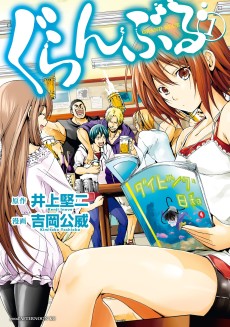 MANGA ComedyGrand Blue
MANGA ComedyGrand Blue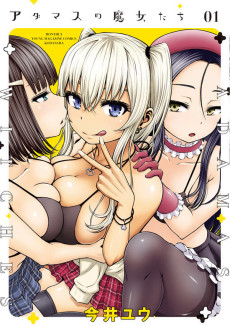 MANGA ComedyAdamas no Majotachi
MANGA ComedyAdamas no Majotachi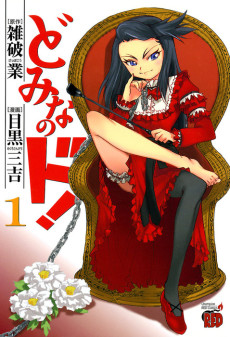 MANGA ComedyDomina no Do!
MANGA ComedyDomina no Do!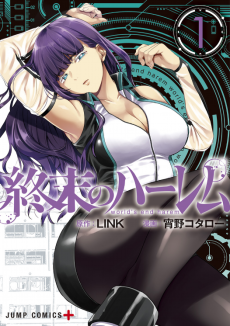 MANGA EcchiShuumatsu no Harem
MANGA EcchiShuumatsu no Harem
SCORE
- (3.55/5)
MORE INFO
Ended inDecember 25, 2017
Trending Level 2
Favorited by 1,028 Users

